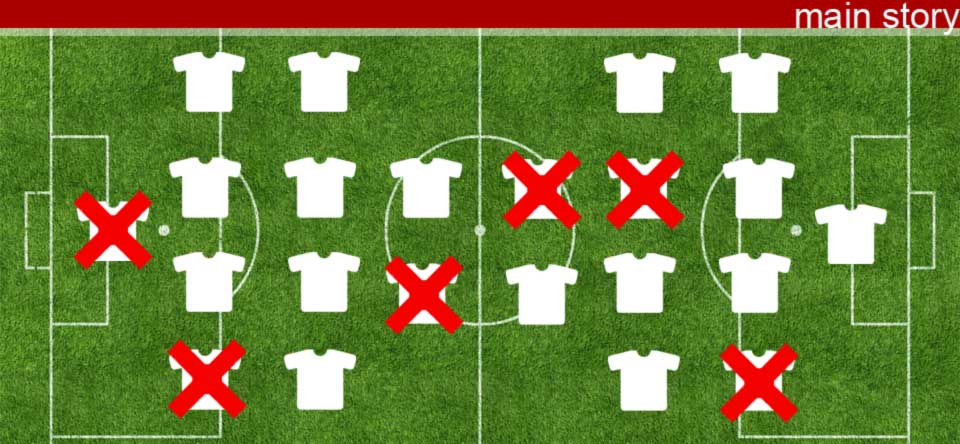Football is one of the most popular sports world-wide. From the favelas of Brazil to the slums of Africa, via the giant stadiums of Europe, football is played, inspiring dreams, becoming a ritual and eradicating cultural and social barriers.
The sport brings together millions of spectators. Although it enjoys exceptional public popularity and reinforces national cohesion, this sport at the same time allows some incredibly racist and violent events to be played out.
While racism has been the most fore coming form of discrimination in football, homophobia is quickly raising as second highest reason for discrimination in football, followed by xenophobia. And when it comes to women’s football, you guess it, sexism ranks as the chosen form of discrimination.
Discrimination in the game, unfortunately, happens at all levels. Among players, among fan clubs and maybe also at the boardroom level where lack of ethnic diversity in management and boardroom positions at many professional clubs is holding back the fight against racism. According to Kick It Out chairman Lord Ouseley, the top of the football pyramid is still "a bastion of white male domination".
On the ground
Racism exists at all levels across football. Even among players themselves. Liverpool's Suarez was handed an eight-match ban and a £40,000 fine by the Football Association after being found guilty of racially abusing Manchester United's Evra.
Former England captain John Terrywas banned for four-matches by the Football Association for abusing rival footballer Anton Ferdinand.
The Serbian Football Association was hit with an $84,000 fine after a brawl between their under-21 team and England's in the city of Krusevac in October 2012. England player Danny Rose said he had been subjected to monkey chants throughout the game.
Passionate fans
Players from a wide range of nationalities have been subject of racial discrimination coming from the stands, especially in Italy.
AC Milan midfielder Kevin-Prince Boateng walked off in a match with Italian lower league side Pro Patria in January after their fans abused him with monkey noises. Mario Balotelli and Boateng were abused by AS Roma fans during a match at the San Siro in May that was briefly suspended by the officials as a result.
Racist behaviour is almost always the work of a minority of fans, who sometimes have a very influential role in the local fan scene or are usually those attracting sensational media coverage. The racism problem is also exacerbated by the rapid increase in footballers leaving their homeland for foreign shores, which subsequently creates potential for the problem.
As Fabio Monti, a journalist with “Corriere della Sera” said: “Racism is very powerful [in Italy] through the pressures exerted by fans and club managements. This is reflected inside the stadiums. The problem is with society.”
The reality of racism
We constantly see headlines outlining the latest incidents, and of course, there are those journalists, fans and players who refuse to let the issue rest, but for every Kevin-Prince Boateng or Mario Balotelli who makes a stand publicly, there are countless other members of the community who unwittingly rationalize bigotry.
"Those fans aren’t representative of the fan-base"
"You wouldn’t understand, it’s a cultural issue"
Long and arduous road ahead
The Union of European Football Associations (UEFA) has made combating racism a priority. “It’s a sad fact of life” said Jonathan Hill, Head of UEFA’s Brussels office, who nonetheless expressed the view that a positive change had taken place over the last ten years: “For a long time football was in a state of denial. People said racism was a social problem, and football positioned itself as a victim of racism. Today things have changed; people have become aware of football’s responsibility, of our duty to combat racism and discrimination.” With the Agreement of Buenos Aires, FIFA has also taken a firm stand regarding any form of discrimination.
While there has been some improvement, there is still a long way to go before everyone feels concerned by the problem. A huge awareness-raising effort is needed, notably with regard to professional sports players, who have a significant impact on public opinion. At the same time, improved representation of ethnic minorities in the stadiums, among the fans and within the professional leagues and the media, should be a key priority.
Recent incidents, e.g. at the Italy-Serbia game or at various games at local level across Europe, highlight that the problem of discrimination in football is still far from being resolved and that supporters are often visible in such incidents.
It therefore remains the responsibility of all clubs, associations and supporters also at national and local level to take or finally start adopting a clear and firm stance against discrimination in football in order to tackle the issue successfully.
Football is the biggest sport in the world and belongs to us all. It should be the right of every person to play, watch and discuss freely, without fear.




